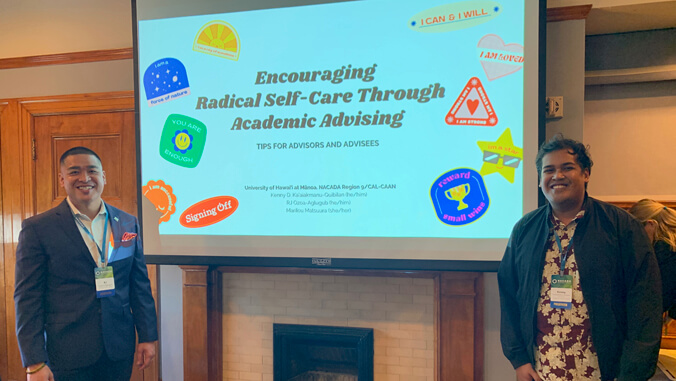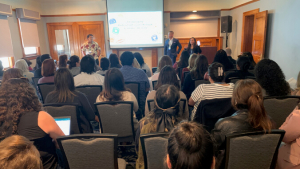
Self-care involves prioritizing activities and practices that promote physical, mental, and emotional well-being. While important for students, faculty and staff, self-care can be easily ignored and rarely talked about. A pair of University of Hawaiʻi at Mānoa academic advisors are looking to change that on campus, across the state and nationwide.

Kenny Kaʻaiakamanu-Quibilan from the Information and Computer Sciences Department and RJ Ozoa-Aglugub from the athletics department earned the “best presentation” award at the National Academic Advising Association (NACADA) Region 9 conference. Kaʻaiakamanu-Quibilan and Ozoa-Aglugub are also both PhD students in the Department of Educational Administration in the College of Education.
Tragedy inspires self-care advocacy
For Kaʻaiakamanu-Quibilan, the issue of self-care goes much deeper. Since starting his position at UH Mānoa in 2021, he has tragically lost two students in his program and spoke with a parent who wanted closure about their child’s last days.
“These were some of my most hardest moments as an advisor, but also some of my most defining moments,” Kaʻaiakamanu-Quibilan said. “There were days when I wondered what I could have done differently or if I saw any warning signs. It was also then that I saw that there was a need, and that need was self-care. As a consequence of those moments, I started actively discussing self-care more with my students and made it a talking point during advising meetings.”
Kaʻaiakamanu-Quibilan and Ozoa-Aglugub’s presentation had three objectives:
- Examine the act of radical self-care as a tool for preservation and rejuvenation
- Survey literature on the importance of practicing self-care for advisees and students in higher education
- Discuss strategies and techniques to incorporate self-care in academic advising practice
The demand for the presentation exceeded the room capacity, and participants had to be moved to a larger room. The award was chosen by conference attendees for the presentation they felt best represented the theme of the conference—systemic change through advising.
“Sometimes self-care is pushed under the rug and rarely discussed,” Kaʻaiakamanu-Quibilan said. “As a result, we see high rates of burnout, anxiety and mental health among students and advisors. RJ and I are aware that if students (or advisors) do not take care of themselves first, then excelling in academics (or work) is difficult. We believe that to advise holistically as advisors, we must incorporate and discuss self-care practices and resources with our students.”
After winning best in region, Kaʻaiakamanu-Quibilan and Ozoa-Aglugub will deliver their presentation at the 2024 NACADA national conference in October at Pittsburgh, Pennsylvania, representing region 9 (Hawaiʻi, California, Nevada, Guam, American Samoa and Northern Mariana Islands).

